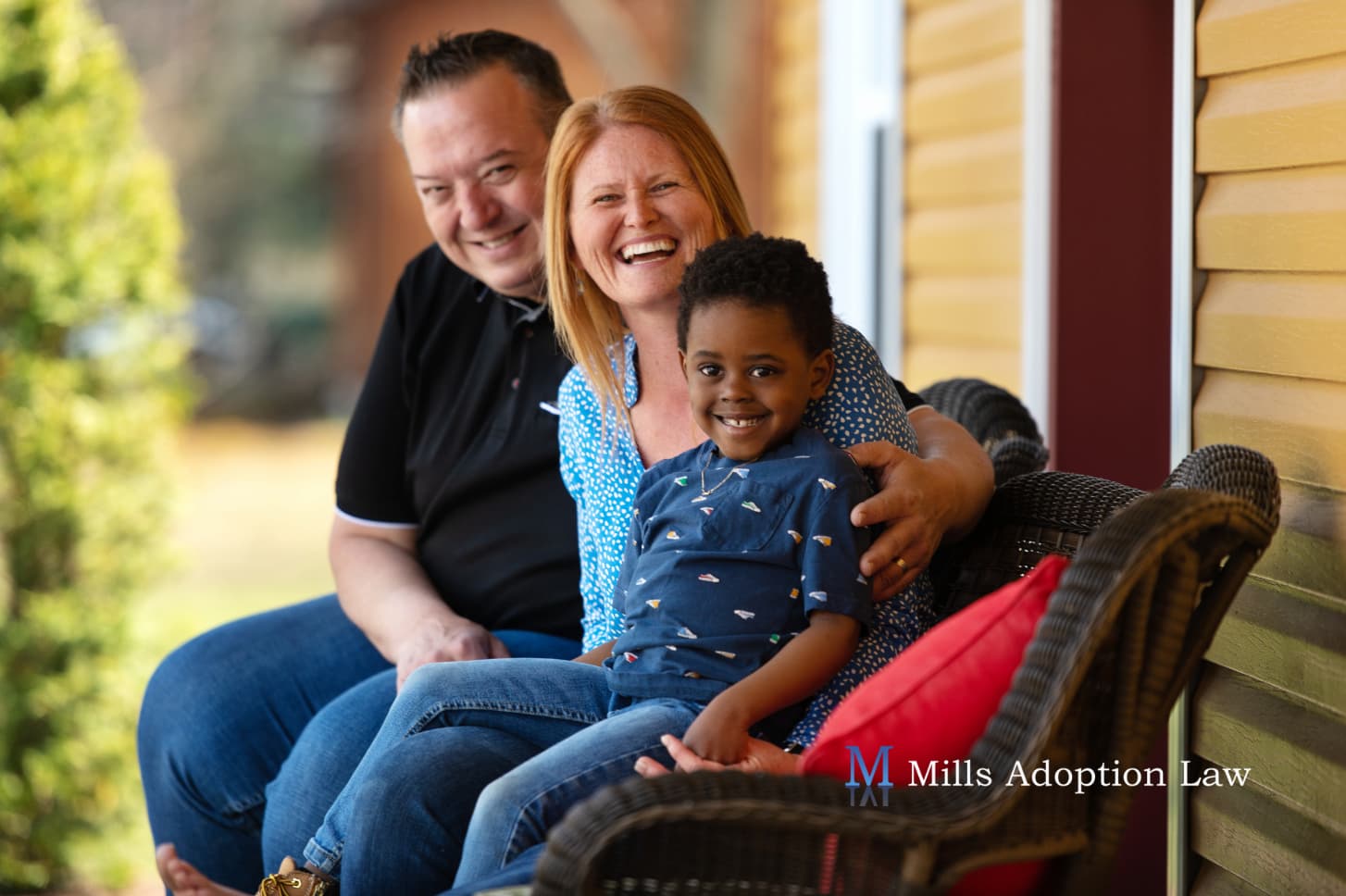Interstate Adoption
Schedule a Consultation TodayInterstate Adoption

Interstate Adoption & ICPC
When you adopt a child from another state, it is an interstate adoption. There are special requirements for interstate adoptions. Adoptive parents must obtain permission from the sending state where the child lives before they leave with the child. They must also obtain permission from the receiving state where the adoptive parents live before they return home with the child. Once both states give approval, then the child can leave and go home with the adoptive parents.
Interstate adoptions must follow the rules in the Interstate Compact on the Placement of Children (ICPC). The purpose is to ensure that children will receive appropriate care and supervision.
Before the ICPC, when a child moved out of state for adoption, the sending state lost authority over the child right away. If there were problems with the child’s placement after the child moved, the sending state could not help. The ICPC ensures that the move is in the child’s best interests before the child even moves. Once the child moves, the ICPC ensures that the sending state can intervene until the finalization of the adoption.
What is the Interstate Compact on the Placement of Children (ICPC)?
The ICPC or Compact is a contract between the states. The Compact is also a law that has been enacted by all the fifty states, the District of Columbia, and the U.S. Virgin Islands. It applies to the movement of children across state lines for purposes of adoption.
How does the ICPC work?
Each state has their own ICPC office. It is a government office. To comply with the ICPC, you must send the required information to the ICPC office in your child’s home state. You must include a summary of the plan for the child’s care, a copy of your home study, financial information, and medical information for the child.
Each state reviews the information to determine if they think that the move is in the child’s best interests. Either office can ask for more information.
How long will I spend in my child’s home state waiting for ICPC paperwork?
ICPC paperwork can take anywhere from a few days to a few weeks to complete. If there are extenuating circumstances that require additional review, the delay may be longer. During that time, you must wait in the child’s home state. Parents typically spend this time bonding as a new family.
What can I do to prepare myself for the ICPC requirements?
It is important to prepare the ICPC paperwork before you travel to take custody of your child. Children do not always arrive on schedule, or you may have a last-minute match. It is important to prepare in advance so that there is less to do while you are away from home.
As you think about the time that you are going to be away, remember that you might be in your child’s home state for several weeks. You may need to arrange with your employer to work remotely or take adoption leave. The time away from home can be hard on families, but you can do what you can to ease the burden by preparing ahead of time.
What happens if I do not comply with the ICPC?
If the ICPC applies to your case, you must follow it. A judge can rescind approvals or otherwise unravel your adoption if you fail to comply with the ICPC.
Experience On Your Side.
Bobby Mills has over 30 years’ experience helping build families through adoption. He can help you with your interstate adoption. We can also connect you with an out-of-state attorney for your ICPC process. Call us today 919-533-4025 to schedule a consultation.
Ask a Question,
Describe Your Situation,
Request a Consultation
Call (919) 306-2899 or fill out the short form below. We will usually respond within 1 business day but often do so the same day. Don’t hesitate, your questions are welcome.
We respect your privacy. The information you provide will be used to answer your question or to schedule an appointment if requested.
Why Choose Mills Adoption Law?
- Experience–Attorney Bobby Mills has over 35 years of experience representing birth parents, adoptive parents, and foster parents through all aspects of adoption and parental rights.
- Adoption Specialist–Other firms include adoption and parental rights as part of their larger family law practice areas. At Mills Adoption Law, we focus exclusively on adoption, parental rights, and foster parent rights.
- Board-Certified–Attorney Bobby Mills is a Fellow of the American Academy of Adoption & Assisted Reproductive Attorneys, certified by the board as a specialist in family law, and the former director of a child placement agency.
- Agency Attorney–At Mills Adoption Law, we also represent child placement agencies and their clients.
Want to Schedule a Consultation?
Schedule a Consultation TodayRelated Services
Experience Matters. Mills Adoption Law has helped our community for over 30 years with adoptions…
People often tell me, “I raised my stepdaughter and stepson like my own children. They…
Blended families are more common than ever. It is estimated the 1 in 3 Americans…
As a same sex married couple can we adopt a child? If we are married,…
Today, open adoptions are the most common type of adoptive relationship. In an open adoption…
When you and your family need a North Carolina adoption attorney for adopting children in…
A second-parent adoption allows a person, a “second parent,” to adopt a child without the…
Grandparents, Relatives, & Kinship Care Arrangements Many parents cannot provide proper care for their children.…
The international adoption process is complex and varies by country. Visit the US State Department…
Guardianships in North Carolina provide legal protection for minors who are orphans, have been abandoned,…
In most adoptions, the emphasis is placed on the mother for obvious reasons. The father…
Experience Matters. Mills Adoption Law has helped our community for over 30 years with adoptions…
independent adoption in north carolina If you have already found a match, an independent adoption…
Related Blogs & News

What Are the 7 Core Issues of Adoption in North Carolina?
Adoption is a meaningful way to grow a family, but there is no cookie-cutter answer…

What Is the Adoption Triad in North Carolina and Why Is It Important?
Adoption is an individualized process. There is no cookie-cutter answer that works for every family,…

7 Mistakes to Avoid When Adopting Out of State
Adopting out of state is exciting and emotional, but it’s also complex. No two adoptions…
Frequently Asked Questions
Faqs About Interstate Adoptions
Below are some frequently asked questions about Interstate Adoptions:
What is interstate adoption?
Interstate adoption means adopting a child from another state or territory. Because two states are involved, the process requires compliance with the laws of both states.
If you are considering adopting a child from another state, it will help to speak to an interstate adoption attorney who can guide you through the process. Mills Adoption Law is an interstate adoption law firm with over 35 years of experience. As a law practice that focuses on adoption, Mills Adoption Law can anticipate problems that others can’t so they don’t become barriers to success.
What is the ICPC?
The ICPC, the Interstate Compact on the Placement of Children, is a uniform law passed in all 50 states and the District of Columbia in the 1960s to establish procedures for interstate adoptions.
How does the ICPC work?
When you intend to move the adoptee across state lines, you must submit paperwork to two ICPC organizations. In short, you will need approval from the ICPC in the adoptee’s state and your home state before returning home with your child.
An experienced interstate adoptions attorney can assist with the ICPC. To comply with the ICPC, you must submit the following information:
- ICPC-l00A: Form requesting ICPC approval to make placement.
- Cover letter identifying the child, birth parent(s), the prospective adoptive parent(s), a statement as to how the match was made, name of the intermediary, if any, and the name of the supervising agency and address.
- Consent or relinquishment signed by the parent(s).
- If a parent elects to follow the laws of the receiving state, a written waiver of the laws of the sending state.
- A statement detailing how the rights of all parents shall be legally addressed.
- Certification by an authorized person or entity that the consent or relinquishment is in compliance with the applicable laws of the sending state.
- Verification of compliance with Indian Child Welfare Act.
- Legal risk acknowledgement signed by the prospective adoptive parents.
- A statement of the basis on which the sending person or agency has authority to place the child and documentation that supervision is on-going.
- Current case history for the child, including custodial and social history, chronology of court involvement, social dynamics, education information (if applicable), and a description of any special needs of the child. If an infant, at a minimum, a copy of the medical records of the birth and hospital discharge summary for the child, if the child has been discharged.
- Foster home license if applicable.
- Adoptive home study or approval and verification of compliance with federal and state background clearances, including FBI fingerprint and Child Abuse/Neglect clearances and Sex Offender Registry clearance.
- Affidavit of Expenses, if applicable.
- Copy of sending agency’s license or certification, if applicable.
- Biological parents’ information-social history, medical history, ethnic background, reasons for adoption plan, and circumstances of proposed placement.
- A written statement from the person or entity that will be providing postplacement supervision; and
- Authority for the prospective adoptive parents to provide medical care.
Interstate adoptions are subject to delay because either state can request additional information to determine if the move is in the child’s best interests.
Complying with the ICPC can be complicated and burdensome. If you are considering interstate adoption, find an adoption lawyer with the experience necessary to make the process smooth and efficient.
Mills Adoption Law focuses on helping growing families through the interstate adoption process.
Will complying with the ICPC delay my adoption?
The ICPC creates additional requirements for the protection of the child. The purpose is to ensure that the adoption complies with the laws in both states and that the adoption is in the child’s best interest.
If you are pursuing an interstate adoption, it is vital to have an experienced interstate adoptions attorney to help guide you through the ICPC process to avoid unnecessary delays.
Professional Associations
Why Should You Choose An Adoption Attorney?
An adoption attorney will:
Provide
We will provide an unbiased explanation of adoption procedures and develop a legally secure plan tailored to your needs.
Assess
We will assess the risks involved, including determining what payments are permissible and ensuring that birth parents are treated fairly and their rights are legally terminated before placement is finalized.
Clarify
We will clarify your options, if any, for post-placement arrangements with birth parents, making sure your interests and those of the child are served.

Explain
We will explain your rights and adoption laws in your state or refer you to attorneys who practice in other states or internationally.
Review
We will review and negotiate the adoption agency contract to protect your interests.
You Should...
Contact
You should contact an attorney as early as possible in the decision-making process.
Learn
Learn about the specific types of adoption services the attorney provides. Ask what percentage of the practice is dedicated to adoption and how many adoption proceedings the attorney has handled.
Choose
Choose an attorney who is experienced in the type of adoption you are considering.

Know
Know what the attorney charges, how fees are structured and that you can afford the services.
Ask
Ask questions, request references, share your concerns and provide the attorney with all relevant documents. Ask for a written retainer agreement that outlines what the attorney charges, how fees are structured and other details regarding fees and fee payment.

















